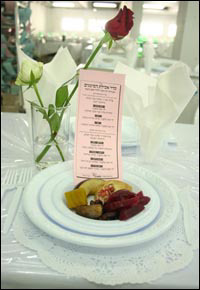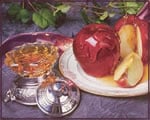With only a few days left before the Jewish New Year of Rosh Hashanah, many Jews still have no plans to attend synagogue services.
They might not be affiliated with a house of worship, they may feel uncomfortable in a traditional synagogue setting, they might be traveling, they might not even be able to afford the fees associated with ticket costs and membership dues at many synagogues. But whatever the reason, recent studies reveal that while Rosh Hashanah and Yom Kippur remain two of the most popular days to attend a synagogue, even for those who don't attend services regularly, the sheer number of those not in attendance is staggering.
Rosh Hashanah begins this year the evening of Sept. 12 and ends at nightfall on Sept. 14. Judging by the responses to a service being offered by Chabad.org, many would-be worshippers are apparently feeling the pangs associated with being left out of next week's celebrations.
With a single mouse-click, anyone can find free and welcoming, as well as local, Rosh Hashanah and Yom Kippur services, by logging on to the search engine located at chabad.org/HighHolidayServices.
The engine's database contains thousands of locations across the globe, from Llandudno, Wales to Byron Bay, Australia; Ho Chi Minh City, Vietnam to Minneapolis, Minn.
"We want to make sure that as many Jews as possible have access to High Holiday services, no matter where they are, no matter their financial means and no matter their background," said George Rohr, a Wall Street investor who together with his wife Pamela made the High Holiday search engine possible.
According to New York-resident Martin Daub, the best part is that Chabad services fill a need for those Jews who are less knowledgeable and may not want to come to synagogue for just that reason.
"Wherever I go, I always check Chabad.org, and that is what I did when we moved to Manhattan," said Martin Daub, who will be praying at Chabad of the West Sixties during the High Holidays. "Going to Chabad feels great. They are non-judgmental and welcoming."
Nancy Meyers, a California native, agreed.
"At Chabad, they do not ask for contributions during the High Holiday services," said Meyers, who attends Chabad JCC-Playa Vista in Culver City, Calif., with her father Herby. "I felt uncomfortable with the idea of tickets. What if someone does not have money to purchase one? At Chabad, no one knows if someone could afford it or not, if they could make a contribution or not."
Rohr, who also spearheaded the beginners' services at Congregation Kehillath Jeshurun on Manhattan's Upper East Side, explained that openness and availability go a long way.
"I think it is important for people to know that when it comes to their Jewish observance, there will be no obstacles in their way," he said. "The global network of Chabad-Lubavitch helps ensure that."
Rabbi Meir Simcha Kogan, project manager and chief architect of the technologically-sophisticated Global High Holiday Events search engine on Chabad.org, said the online tool fit very much into Rohr's vision: "It became clear to us that the easiest way to help these people who don't have a community or synagogue of their own is to make the information available to them on the Internet."
A Wealth of Info

The High Holiday section of Chabad.org, which just sent out hundreds of thousands of e-mails informing readers that Chabad-Lubavitch "saved a seat" for them this year, is also home to a wealth of information on Rosh Hashanah, Yom Kippur and the season’s other holidays of Sukkot, Shemini Atzeret and Simchat Torah.
Designers culled information from more than 720 sources, both ancient and contemporary, in building the section, which features prayer excerpts, Bible readings, childrens' stories, and a thorough examination of the season's many practices. It provides, for example, more than 35 different explanations for the sounding of the shofar, or ram's horn, on Rosh Hashanah.
Users can also e-mail free New Year greeting cards to family and friends across the globe.






Start a Discussion